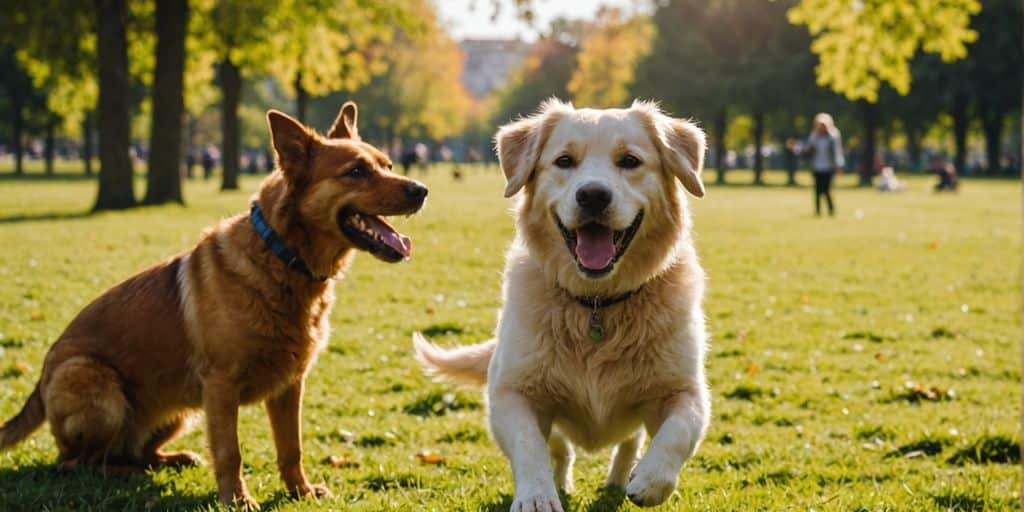Socializing your dog is key to ensuring they lead a happy and healthy life. Whether you have a puppy or an adult dog, proper socialization helps them feel comfortable in different situations, interact well with other dogs and people, and reduce anxiety. This article will guide you through effective tips and strategies to help your furry friend become well-socialized.
Key Takeaways
- Socializing dogs helps them live healthier and happier lives by reducing stress and anxiety.
- Puppies benefit greatly from early socialization, which helps prevent future behavior problems.
- Adult dogs can still be socialized, although it requires more patience and consistency.
- Dog daycare centers offer a controlled environment for dogs to interact and play under supervision.
- Recognizing signs that your dog needs socialization is crucial for their well-being.
Promote Healthy Dog Lives Through Socialization
Socializing your dog is key to ensuring they lead a happy and balanced life. A well-socialized dog is more likely to be confident and less anxious. Here are some ways socialization can promote a healthy life for your dog:
Benefits of Regular Interaction
Regular interaction with other dogs and people helps your dog develop good behaviors and reduces fear and anxiety. This is especially important for young dogs, as early socialization helps them become more confident and friendly.
Importance of Exercise and Play
Exercise and play are crucial for a dog's physical and mental health. Social dogs are more likely to engage in play, which helps them burn off energy and stay fit. Remember, a tired pup is a good pup!
Reducing Stress and Anxiety
Socialization can significantly reduce stress and anxiety in dogs. When dogs are comfortable around others, they spend less time feeling stressed and more time having fun. This leads to a happier and healthier life for your furry friend.
Socializing your dog will lead to a happier pup overall – and that makes you one happy pet parent! With plenty of playtime, opportunities to meet their BFFF (best furry friend forever) and exercise, your pup will be coming home happy and relaxed.
Developing Confidence in Your Dog
Positive Reinforcement Techniques
Positive reinforcement is a powerful tool to build your dog's confidence. Rewarding your dog with treats, praise, or playtime when they exhibit desired behaviors encourages them to repeat those actions. This method helps your dog associate good behavior with positive outcomes, making them more likely to behave well in the future.
Exposure to Various Stimuli
Introducing your dog to different environments, sounds, and experiences can help them become more adaptable and less fearful. Start with controlled settings and gradually increase the level of exposure. This process, known as desensitization, can significantly reduce anxiety and build your dog's confidence.
Handling New Situations Calmly
When faced with new situations, it's important to remain calm and composed. Your dog can sense your emotions and will often mirror your behavior. By staying relaxed, you can help your dog feel more secure and confident in unfamiliar circumstances.
Building confidence in your dog is a gradual process that requires patience and consistency. Celebrate small victories and continue to support your dog as they grow more self-assured.
The Role of Dog Daycare in Socialization
Supervised Playtime Benefits
Dog daycare offers a controlled environment where dogs can interact under supervision. This ensures that playtime is safe and positive. Dogs learn to communicate and play with others, which helps them become more social and well-behaved.
Controlled Social Environments
In a daycare setting, dogs are exposed to various stimuli in a controlled manner. This helps them get used to different sounds, sights, and smells without feeling overwhelmed. Over time, this exposure can make them more adaptable and less anxious in new situations.
Finding the Right Daycare
Choosing the right daycare is crucial. Look for facilities with trained staff, clean environments, and positive reviews. A good daycare will provide regular updates on your dog's progress and ensure they are happy and healthy.
Socialization Tips for Puppies
Early Socialization Strategies
Creating a positive environment is key. Offer plenty of positive reinforcement like treats and praise when your puppy shows good behavior. This helps them link new experiences with positive feelings. Gradually introduce your puppy to different sights, sounds, smells, and textures. Start with gentle exposures and slowly increase the intensity as they get more comfortable.
Introducing Puppies to New Experiences
Take your puppy on regular outings to new places such as parks, pet-friendly stores, and outdoor events. Expose them to various stimuli like crowds, traffic noises, and different weather conditions. This will help them become adaptable and confident in different environments. Arrange supervised playdates with other well-socialized dogs and, if possible, introduce your puppy to other animals like cats or small pets in a controlled and safe manner.
Building Positive Associations
Encourage interactions with friendly people, including children, adults, and the elderly. Puppy socialization classes offer a structured and supportive environment where puppies can learn and grow alongside their peers. These classes are led by professional trainers who understand puppy development and behavior. They provide a controlled setting for puppies to interact with each other under expert supervision, allowing them to learn important social skills while having fun.
How to Socialize an Adult Dog
Socializing an adult dog can be more challenging than socializing a puppy, but it's definitely possible. Patience and consistency are key to helping your dog become more comfortable in new situations. Here are some steps to guide you through the process:
Challenges of Socializing Older Dogs
Older dogs may have established behaviors and fears that can make socialization more difficult. They might be hesitant to accept new experiences and can be more set in their ways. However, with the right approach, you can help your dog overcome these obstacles.
Step-by-Step Socialization Guide
- Go for Walks: Walks are great for exercise and socialization. Let your dog take in the sights, smells, and sounds of the neighborhood. If you encounter a stressful situation, simply turn around and go home.
- Introduce Your Dog to Another Adult Dog: Start with a familiar activity like walking. Meet up with a friend and their dog for a relaxed walk, keeping plenty of space between the dogs. Reward calm behavior with treats.
- Introduce Your Dog to an Adult Human: Invite a friend over and ask them to ignore your dog at first. Reward your dog for staying calm. Gradually allow your friend to give your dog treats.
- Introduce Your Dog to Puppies and Children: Follow the same steps as with adult dogs and humans, but be mindful that the experience will be different.
- Visit Dog Parks: Start with short visits and gradually increase the time as your dog becomes more comfortable.
- Attend Doggy Daycare: Once your dog is more socialized, doggy daycare can provide a controlled environment for further socialization.
Maintaining Consistency and Patience
Consistency is crucial in socializing an adult dog. Regularly expose your dog to new experiences and people. Be patient and always reward positive behavior. Remember, socialization is an ongoing process, and your dog will continue to learn and grow with each new experience.
Socializing an adult dog may take time, but the rewards are worth it. Your dog will be happier, more relaxed, and better able to handle new situations.
Recognizing Signs Your Dog Needs Socialization
Behavioral Indicators
Recognizing when your dog needs socialization is crucial for their well-being. Look for signs such as fear or aggression around people or other animals. If your dog backs up or raises their hackles when approached, it may indicate a need for socialization. Nervousness during walks and shyness around other dogs or people are also key indicators.
Addressing Fear and Aggression
If your dog shows fear or aggression, it's important to address these behaviors promptly. Start by introducing them to new experiences gradually. Use positive reinforcement to reward calm behavior. This can help reduce anxiety and build confidence.
Creating a Socialization Plan
Creating a socialization plan can help your dog become more comfortable in various situations. Include activities like walks, meeting new people, and visiting dog parks. Consistency and patience are key. Over time, your dog will learn to enjoy these experiences and become more relaxed and happy.
Socializing your dog is not just about making them friendly; it's about ensuring they lead a happier, more relaxed life.
Conclusion
In conclusion, socializing your dog is one of the best things you can do for their happiness and well-being. Whether you have a playful puppy or a more reserved adult dog, introducing them to new experiences, people, and other animals can make a world of difference. A well-socialized dog is not only more confident and less anxious, but also more adaptable to different situations. Remember, the key to successful socialization is patience, consistency, and lots of positive reinforcement. By investing time and effort into socializing your dog, you're setting them up for a happier, healthier life. So get out there, explore new places, and let your furry friend make some new pals!
Frequently Asked Questions
Why is socializing my dog important?
Socializing your dog helps them become well-rounded and confident. It reduces anxiety, promotes good behavior, and ensures they enjoy interactions with other dogs and people.
When should I start socializing my puppy?
The best time to start socializing your puppy is between 3 and 14 weeks old. This is when they are most open to new experiences and can learn to adapt easily.
Can older dogs still be socialized?
Yes, older dogs can still be socialized. While it may take more time and patience, with consistent positive reinforcement, older dogs can learn to enjoy new experiences and interactions.
What are some signs my dog needs more socialization?
Signs your dog may need more socialization include fear or aggression around other animals or people, nervousness during walks, and excessive barking or hiding.
How can dog daycare help with socialization?
Dog daycare provides a controlled and supervised environment where dogs can interact with others. It's a great way for them to get exercise, make friends, and learn positive behaviors.
What are some tips for socializing a puppy?
Expose your puppy to a variety of sights, sounds, and environments. Arrange playdates with other dogs, take them on walks, and use positive reinforcement to reward good behavior.

